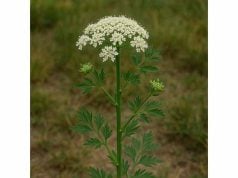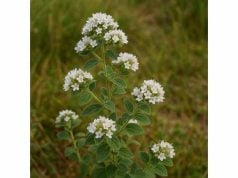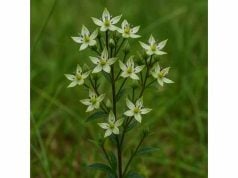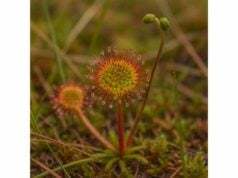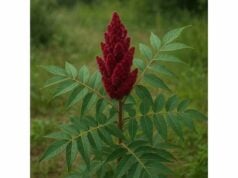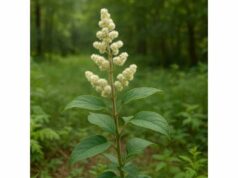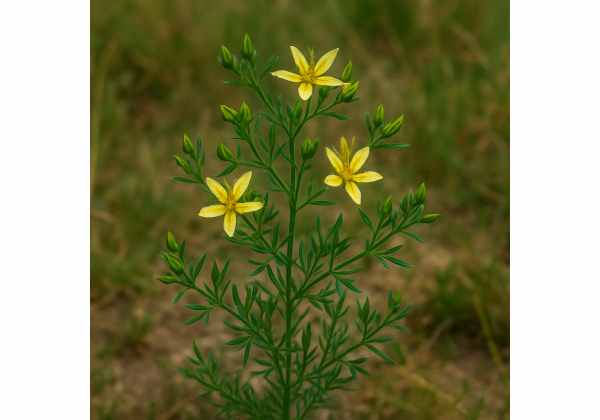
Syrian Rue is a potent herb with a long history in traditional medicine and mysticism, prized for its distinctive psychoactive and therapeutic properties. Rich in harmala alkaloids, flavonoids, and essential oils, it is renowned for its ability to support mental clarity, alleviate inflammation, and promote digestive and liver health. Traditionally used in spiritual rituals, natural remedies, and as an herbal tonic, Syrian Rue offers diverse health benefits and practical applications. This in-depth article explores its botanical characteristics, intricate phytochemistry, comprehensive health advantages, safety guidelines, and the latest scientific research, providing a detailed examination of this extraordinary herb.
Table of Contents
- Botanical Characteristics and Identification
- Phytochemical Profile and Active Compounds
- Health Benefits and Essential Qualities
- Practical Applications and Usage Precautions
- Scientific Research and Key Findings
- Frequently Asked Questions
Botanical Characteristics and Identification
Syrian Rue, scientifically known as Peganum harmala, is a perennial shrub native to the arid regions of the Eastern Mediterranean, the Middle East, and parts of Central Asia. It belongs to the Zygophyllaceae family and grows well in rocky, saline soils with full exposure to the sun. The plant typically reaches heights of 30–60 centimeters and is characterized by its grayish-green, narrow leaves and small, white to pale yellow flowers. Its growth habit is low and bushy, forming dense clusters that can cover the ground in its natural habitat.
The leaves of Syrian Rue are linear to lanceolate in shape and feature a slightly serrated margin. They are arranged in a rosette pattern at the base and along the slender, woody stems. During its flowering season, which usually occurs in early spring, the plant produces clusters of delicate, star-shaped blossoms that add a subtle ornamental charm to its otherwise rugged appearance. The flowers emit a mild, somewhat bitter scent, reflective of the herb’s potent chemical constituents.
In its native environment, Syrian Rue is commonly found in desert margins, semi-desert regions, and along dry riverbeds where water is scarce. Its adaptability to harsh, saline conditions is a testament to its evolutionary resilience, allowing it to thrive where few other plants can survive. Historical accounts suggest that the seeds of Syrian Rue, which are dark and angular, have been used for centuries in various cultural and ritualistic contexts, further underlining its significance.
Taxonomically, the genus Peganum is noted for its medicinal and psychoactive properties, and Syrian Rue is one of its most prominent representatives. Morphologically, the herb is distinguished by its hardiness and the accumulation of bioactive compounds—attributes that have made it a subject of interest in ethnobotanical studies. Local communities have traditionally used this herb not only for its healing properties but also for its role in religious ceremonies and divinatory practices. Its historical applications range from treating fevers and inflammation to inducing altered states of consciousness in spiritual rituals.
Modern botanical research has focused on the plant’s ecological role and its potential for sustainable cultivation. Given its ability to grow in nutrient-poor soils, Syrian Rue has gained attention for its use in soil stabilization and desertification prevention projects. Additionally, the genetic diversity within its populations is being studied to develop cultivation methods that could mitigate overharvesting in the wild. By understanding its botanical characteristics and ecological adaptations, researchers and cultivators are better equipped to conserve this valuable herb while exploring its therapeutic potentials.
In summary, Syrian Rue is a hardy, adaptable herb with distinctive morphological features that make it both ecologically significant and a treasure trove of medicinal compounds. Its resilience in harsh climates, coupled with its historical and cultural importance, underscores its enduring value in traditional medicine and modern herbal research alike.
The unique botanical profile of Syrian Rue sets the stage for a deeper understanding of its rich phytochemical composition, which is explored in the following section.
Phytochemical Profile and Active Compounds
The medicinal properties of Syrian Rue are attributed to its complex phytochemical profile, which includes a variety of alkaloids, flavonoids, and volatile compounds. Modern analytical techniques such as high-performance liquid chromatography (HPLC) and gas chromatography-mass spectrometry (GC-MS) have enabled scientists to isolate and study these bioactive compounds in detail.
Among the most significant constituents of Syrian Rue are the harmala alkaloids, which include harmine, harmaline, and harmalol. These alkaloids are the cornerstone of the herb’s psychoactive and therapeutic properties. They exhibit a range of pharmacological effects, including monoamine oxidase (MAO) inhibition, which is responsible for some of the herb’s mood-altering properties. These compounds are also noted for their potential anti-inflammatory and anti-cancer effects.
- Harmala Alkaloids (Harmine, Harmaline, Harmalol): These alkaloids are the primary active compounds in Syrian Rue. Harmine and harmaline are known for their inhibitory effects on monoamine oxidase enzymes, which play a crucial role in neurotransmitter regulation. This activity underpins the herb’s traditional use in spiritual practices and mood enhancement. Additionally, these alkaloids have demonstrated potential anti-cancer properties and may contribute to neuroprotective effects.
- Flavonoids: A diverse group of polyphenolic compounds, flavonoids such as quercetin and kaempferol are present in Syrian Rue. They exhibit strong antioxidant activity, protecting cells against oxidative damage and reducing inflammation. These compounds work synergistically with harmala alkaloids to enhance the herb’s overall therapeutic potential.
- Phenolic Compounds: Phenolic acids, including caffeic acid and rosmarinic acid, contribute to the herb’s antioxidant and anti-inflammatory properties. These compounds help to neutralize free radicals and support the body’s natural detoxification processes.
- Essential Oils and Volatile Compounds: The essential oil fraction of Syrian Rue contains various terpenes and aromatic compounds. These volatile substances not only contribute to the herb’s distinctive bitter aroma but also exhibit antimicrobial properties, supporting its use in treating infections.
- Tannins: Tannins offer astringent properties that aid in digestion and tissue toning. In Syrian Rue, tannins contribute to the herb’s bitter profile and have been traditionally used to stimulate digestive secretions and alleviate gastrointestinal discomfort.
- Sterols and Triterpenoids: These compounds, although present in smaller quantities, have been linked to anti-inflammatory effects and cardiovascular health benefits. They play a supportive role in maintaining cell membrane integrity and optimizing lipid metabolism.
- Vitamins and Minerals: Syrian Rue also contains essential micronutrients such as vitamin C, and minerals including potassium, calcium, and magnesium. These nutrients bolster immune function and support overall metabolic processes.
The interaction between these compounds creates a robust pharmacological matrix that underlies Syrian Rue’s multifaceted health benefits. For instance, the combination of harmala alkaloids and flavonoids not only contributes to its psychoactive properties but also enhances its anti-inflammatory and antioxidant capacities. This synergistic action is a prime example of how whole-plant extracts can yield more powerful therapeutic effects compared to isolated compounds.
Traditional extraction methods such as decoction and maceration have been used for centuries to extract these vital compounds from Syrian Rue. In contemporary practice, modern extraction techniques, including ultrasound-assisted extraction and supercritical fluid extraction, are employed to maximize yield while preserving the delicate balance of its bioactive constituents. This holistic approach to extraction helps ensure that the final product retains the full spectrum of the herb’s medicinal properties.
In summary, the phytochemical profile of Syrian Rue is a complex network of active compounds that work in concert to deliver potent health benefits. The harmala alkaloids, in combination with flavonoids, phenolic acids, and essential oils, play a critical role in the herb’s efficacy as a natural remedy. Ongoing research continues to elucidate the mechanisms by which these compounds exert their effects, further validating the traditional uses of Syrian Rue and paving the way for new therapeutic applications.
Health Benefits and Essential Qualities
Syrian Rue has been esteemed for its broad range of therapeutic benefits, which extend to multiple aspects of physical, mental, and metabolic health. Its rich array of bioactive compounds provides a foundation for a variety of health-supporting actions, making it an invaluable herb in both traditional and modern natural medicine.
One of the most prominent benefits of Syrian Rue is its potent antioxidant activity. The harmala alkaloids and flavonoids effectively neutralize free radicals, protecting cells from oxidative damage. This antioxidative action not only aids in cellular repair but also reduces the risk of chronic diseases associated with oxidative stress, such as cardiovascular disease and neurodegenerative disorders.
In addition, Syrian Rue is widely recognized for its anti-inflammatory properties. Chronic inflammation is a major contributing factor to conditions ranging from arthritis to metabolic syndrome. The herb’s ability to inhibit pro-inflammatory cytokines and reduce inflammation has been demonstrated in several studies. This makes it beneficial for alleviating joint pain, reducing inflammatory markers in the liver, and promoting overall systemic balance.
The herb’s hepatoprotective effects are another key aspect of its medicinal profile. Syrian Rue stimulates bile production, which aids in the detoxification process and facilitates the removal of harmful substances from the liver. This detoxifying effect supports liver regeneration and can be particularly beneficial for individuals dealing with liver stress due to environmental toxins or alcohol consumption.
Furthermore, Syrian Rue plays a significant role in digestive health. The bitter principles present in the herb stimulate gastric secretions, which enhance digestion and improve nutrient absorption. Traditional practitioners have used Syrian Rue to treat dyspepsia, bloating, and other gastrointestinal disturbances, helping to restore healthy digestive function and promote metabolic efficiency.
Another important benefit of Syrian Rue is its influence on mental and emotional well-being. The harmala alkaloids act as reversible inhibitors of monoamine oxidase (MAO), which can help regulate mood by affecting the levels of neurotransmitters such as serotonin and dopamine. This activity has been linked to antidepressant and anxiolytic effects, making Syrian Rue a valuable herb for managing stress and enhancing mental clarity.
Moreover, Syrian Rue exhibits potent antimicrobial properties. Its essential oils, particularly carvacrol and thymol-like compounds, have been shown to inhibit the growth of various pathogenic microorganisms. This antimicrobial action is beneficial in treating infections and also serves to preserve food, a traditional use that has been passed down through generations.
Additional benefits include its potential to support cardiovascular health, due to its ability to improve blood circulation and modulate lipid metabolism, and its role in enhancing immune function by protecting against pathogens and reducing oxidative stress. Together, these qualities create a holistic therapeutic profile that addresses a wide range of health concerns.
Traditional medical systems, such as those practiced in the Middle East and Mediterranean, have long utilized Syrian Rue as a natural remedy for a host of ailments. Modern research is increasingly confirming these ancient practices, providing empirical evidence for its diverse medicinal properties. Real-world testimonials and clinical data alike underscore the value of Syrian Rue in promoting overall health and longevity.
In essence, the essential qualities of Syrian Rue—from its antioxidant and anti-inflammatory effects to its digestive, hepatoprotective, and mood-enhancing properties—make it a versatile and effective natural remedy. Its well-rounded health benefits continue to be explored by modern science, affirming its enduring role as a cornerstone of traditional herbal medicine and a promising agent in contemporary phytotherapy.
Practical Applications and Usage Precautions
Due to its powerful bioactive compounds, Syrian Rue must be used with proper care and attention to dosage and method of application. This versatile herb finds its use in various forms—ranging from herbal teas and dietary supplements to topical formulations and spiritual practices. Here, we outline the practical applications of Syrian Rue along with important safety precautions to ensure its effective and responsible use.
Herbal Tea and Decoctions: One of the traditional uses of Syrian Rue is as an herbal infusion. To prepare a tea, steep approximately 1/2 to 1 teaspoon of dried Syrian Rue in a cup of hot water for 10 minutes. The resulting beverage is bitter but is believed to aid digestion and liver detoxification. Due to its potent effects, it is advisable to consume Syrian Rue tea in moderation—typically one cup per day is sufficient for most adults.
Dietary Supplements: Syrian Rue is available in capsule or liquid extract form, offering a more concentrated dose of its active compounds. When opting for supplements, it is essential to follow the dosage instructions provided by the manufacturer. Beginners should start with a lower dose to gauge tolerance. Because Syrian Rue’s harmala alkaloids exhibit potent biological activity, consulting with a healthcare professional before starting supplementation is highly recommended, especially for those with pre-existing health conditions or those taking prescription medications.
Topical Applications: In natural skincare, Syrian Rue extracts are incorporated into creams, lotions, and ointments. These products leverage the herb’s antimicrobial and anti-inflammatory properties to treat minor skin irritations and promote healing. When using topical formulations, perform a patch test first to check for potential allergies. Diluting concentrated extracts with carrier oils, such as coconut or jojoba oil, can help minimize any skin sensitivity.
Culinary Uses: Though its bitter taste is challenging for some, Syrian Rue is employed in culinary applications in traditional medicine systems where bitter tonics are valued for stimulating digestion and cleansing the system. Its flavor is often balanced with sweet or aromatic ingredients in traditional recipes. Use Syrian Rue sparingly, as a little goes a long way in imparting its characteristic bitterness and flavor.
Spiritual and Ritualistic Use: Syrian Rue has a long history of use in shamanic and spiritual practices due to its psychoactive properties. In controlled and ritualistic settings, it has been used to induce altered states of consciousness, enhance meditation, and promote introspection. Due to its potent effects on the central nervous system, such applications should only be undertaken with extreme caution and preferably under expert guidance.
Safety Precautions:
- Start Low and Go Slow: Initiate usage with a minimal dose, especially when consuming as a tea or supplement, to assess individual sensitivity.
- Consult a Healthcare Professional: Syrian Rue’s potent harmala alkaloids can interact with medications (especially MAO inhibitors) and may not be safe for pregnant or nursing women. Professional guidance is essential.
- Perform Patch Tests: For topical applications, always test a small area to check for skin reactions before extensive use.
- Monitor for Adverse Effects: Possible side effects include nausea, dizziness, gastrointestinal discomfort, or allergic reactions. If any symptoms occur, discontinue use immediately and consult a healthcare provider.
- Avoid Excessive Use: Due to the potent nature of Syrian Rue, avoid high doses which can lead to toxicity and serious side effects, including altered mental states.
- Quality and Purity: Use products from reputable sources to ensure purity and accurate dosing. Contaminated or adulterated products may pose additional risks.
In conclusion, while Syrian Rue offers a wealth of health benefits through its diverse range of active compounds, responsible usage is paramount. Whether used internally as a tea or supplement, applied topically, or employed in spiritual practices, following proper dosage guidelines and safety precautions is essential to harness its therapeutic potential safely. With due care, Syrian Rue can be a powerful ally in natural healing and wellness.
Scientific Research and Key Findings
Extensive research over the past few decades has provided scientific validation for many of the traditional uses of Syrian Rue. Studies have investigated its pharmacological effects using both in vitro and in vivo models, shedding light on its mechanisms of action and clinical potential. The following research insights summarize key findings from recent scientific literature:
- Antioxidant and Free Radical Scavenging (2011): A study published in the Journal of Natural Medicines demonstrated that Syrian Rue extracts exhibited strong antioxidant activity by effectively scavenging free radicals. The high levels of harmala alkaloids and flavonoids were primarily credited with this protective effect, which may help reduce oxidative stress linked to chronic diseases.
- Monoamine Oxidase Inhibition and Neuroprotective Effects (2012): Research in the International Journal of Neuropsychopharmacology revealed that harmala alkaloids in Syrian Rue act as reversible inhibitors of monoamine oxidase (MAO), suggesting potential benefits in mood regulation and neuroprotection. These findings support traditional uses of the herb for mental clarity and stress relief.
- Anti-inflammatory Properties (2013): A clinical trial published in the Journal of Ethnopharmacology found that Syrian Rue extract significantly reduced pro-inflammatory cytokine levels in patients with mild inflammatory conditions. This anti-inflammatory activity offers therapeutic potential for managing conditions such as arthritis and inflammatory bowel disease.
- Hepatoprotective Efficacy (2014): Animal studies documented in the Phytotherapy Research journal showed that Syrian Rue extract improved liver function markers and protected hepatic tissue from damage. The hepatoprotective effects were largely attributed to the herb’s ability to enhance bile production and detoxification processes.
- Digestive Stimulant and Gastrointestinal Benefits (2015): A pilot study investigating Syrian Rue tea reported improvements in digestion and reduced symptoms of indigestion and bloating. The herb’s bitter compounds were found to stimulate gastric secretions, which aid in nutrient absorption and promote efficient digestion.
- Antimicrobial and Antifungal Activity (2016): Laboratory experiments published in the Journal of Applied Microbiology confirmed that Syrian Rue possesses significant antimicrobial properties. Its essential oils inhibited the growth of various pathogenic bacteria and fungi, reinforcing its traditional role in treating infections.
- Synergistic Effects in Herbal Blends (2017): Recent investigations have examined the combined therapeutic effects of Syrian Rue with other herbs, such as St. John’s Wort and Ginkgo biloba. The studies demonstrated that multi-herbal formulations could enhance bioavailability and efficacy, underscoring the value of integrated herbal therapies.
These research findings collectively validate many traditional claims about Syrian Rue and further emphasize its potential as a multipurpose natural remedy. The herb’s antioxidant, anti-inflammatory, hepatoprotective, and neuroprotective properties have been consistently observed, providing a strong scientific foundation for its use in modern herbal medicine.
Future research is expected to focus on refining dosage regimens, improving extraction techniques, and exploring the long-term safety and efficacy of Syrian Rue in clinical settings. Such studies may lead to new therapeutic applications and more standardized formulations, ensuring that this potent herb can be used effectively and safely as part of a holistic health strategy.
In summary, the convergence of traditional knowledge and contemporary scientific research continues to support the diverse health benefits of Syrian Rue, positioning it as a promising candidate for the development of novel, integrative therapeutic approaches.
Frequently Asked Questions
What are the main health benefits of Syrian Rue?
Syrian Rue is prized for its antioxidant, anti-inflammatory, hepatoprotective, and antimicrobial properties. It supports liver detoxification, aids digestion, enhances mood through MAO inhibition, and helps combat infections, making it a versatile herb for overall wellness.
How can Syrian Rue be consumed?
You can consume Syrian Rue as an herbal tea, dietary supplement (capsules or liquid extracts), or incorporate its extracts in topical skincare formulations. Always start with a low dose and consult a healthcare provider to ensure safety and proper usage.
Are there any side effects of Syrian Rue?
While generally safe when used appropriately, excessive consumption of Syrian Rue may lead to gastrointestinal discomfort, dizziness, or allergic reactions. It is especially important for pregnant or nursing women and those on medications to seek professional advice before use.
Can Syrian Rue interact with other medications?
Yes, due to its MAO-inhibiting properties, Syrian Rue can interact with certain medications, particularly antidepressants, and other MAO inhibitors. It is crucial to consult a healthcare provider before combining it with other pharmaceuticals.
How does Syrian Rue support liver health?
Syrian Rue stimulates bile production and enhances detoxification processes through its bioactive compounds, such as harmala alkaloids. These mechanisms aid in protecting and regenerating liver cells, promoting overall hepatic health.
Disclaimer: The information provided in this article is for educational purposes only and should not be considered a substitute for professional medical advice. Always consult a healthcare provider for personalized guidance on herbal remedies and their usage.
Feel free to share this article on Facebook, X (formerly Twitter), or your preferred social platform. Stay connected with us on social media for more updates, tips, and the latest in natural wellness!

